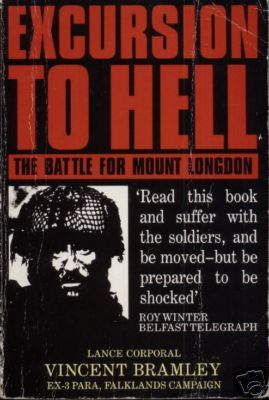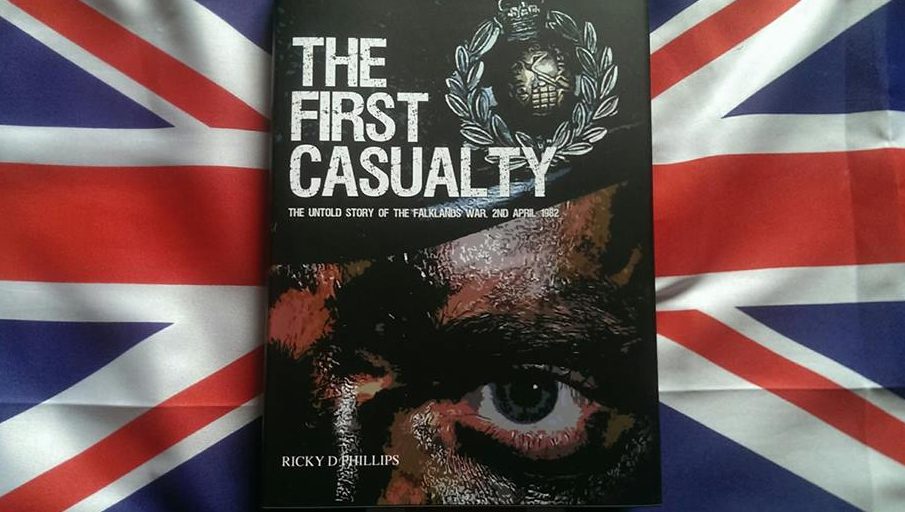On the eve of the 36th anniversary of the Falklands War, I wanted to look back at some of the books which have radically altered our perceptions of that war and the people involved and, in many cases, changed a lot of what we thought we knew about the Falklands War which, I believe, for such a short campaign, has more misconceptions and misunderstandings from all sides than any other.
As author of such a book which truly did change everything we thought we knew about the Falklands War – a feat in itself – I wanted to introduce the reader to a few more, which dramatically changed out understanding of this conflict and which, often, came in for a great deal of censure, criticism and conjecture in themselves before finally being accepted by mainstream history and academia:
1 – Los Chicos de la Guerra – Daniel Kon.

Daniel Kon’s book, “Los Chicos de la Guerra” (The boys of the war) was billed as the book that even the junta couldn’t ban, and became over time the mainstay of our understanding of the true face of the war from the Argentine perspective. With no ‘gung-ho’ or ‘macho-glory’ style, Kon interviewed dozens of Argentine veterans over many months to bring us true life stories of fear, hope, desperation and the real-life terror, misery and sometimes humour and cameraderie in wartime. Initially despised as anti-Argentine propaganda, “Los Chicos” has now become one of the most famous ‘from the other side’ books in military history and compulsory reading in Argentine schools. Taking the form of a number of set-piece interviews, this is perhaps the best book, for my money, in understanding the Argentine side of the Falklands War by those who were there.
2 – Excursion to Hell – Vincent Bramley.

Vince Bramley – former 3 Para in the Falklands and veteran of the battles of Mount Longdon and Wireless Ridge – brought us one of the most visceral first-hand accounts of the fighting in the Falklands ever seen. Eminently readable (I finished it in two sittings) and compelling, Bramley’s story resonated with a number of former servicemen who fought in the Falklands War and was later complimented by similar books from James O’Connell (3 Para) and Tony Banks (2 Para) in their own personal accounts. What made this book unforgettable, however, was just one page right at the very back (Pg. 190 in the English version) in which Bramley described the execution of three American Mercenaries in Argentine service after the battle of Mount Longdon. This single page brought the book in for severe censure and involved a police investigation, half of 3 Para battalion being questioned and even a site visit to the battlefield in search of evidence. The Paras largely distanced themselves from Bramley, claiming post-combat mental illness and the police investigation yielded nothing, yet there are some who believe this to be a cover-up, and I know personally that the version seen on Page 190 is not the original but a revised version of Bramley’s original words which were considered too controversial for print. Bramley followed up this most famous of books in 2009 with his follow-on “Two sides of Hell” which involved contributions from veterans of both sides of the conflict, but which was eternally overshadowed by his original book.
3 – Argentine Fight for the Falklands – Martin Middlebrook.

Martin Middlebrook, historian and journalist, pulled a significant coup by being the first British reporter to be allowed full access to the Argentine military after the Falklands war. Interviewing mostly officers (some very senior) as well as some soldiers from the Argentine Army and Navy (although their Air Force declined to participate) Middlebrook brought to life the experiences of those who commanded in the war and covered it from as many angles as possible, to challenge a great deal of what we knew about the war as much as that which we did not. In more recent years (and I’ve heard this said myself by Argentine veterans) it transpires that many of the interviews felt a bit restricted and forced and that there was a definite sense of ‘get it right’ from the Argentine military to their still-serving veterans who were not allowed much lateral space to vent their full thoughts. This said, the book remains an excellent insight and an indispensable addition to any Falklands War library.
4 – 74 Days – John Smith.

Falkland Islander and Stanley resident John Smith documented his war-time experiences in his private diary and then broke it up and hid the passages around the house should they be discovered. After the war, and through to 1984, he pieced them together again and created one of the most compelling first-hand narratives of the Falklands War by those who were there throughout the invasion, occupation and liberation with everything from the weather to the scraps of news of the task force, the hopes of liberation, the local gossip and the Argentine propaganda as well as a detailed insight into life under military occupation. Other examples of similar books exist by such authors as Graham Bound as well as some excellent unpublished diaries which I have had access to (The Falklands War from the end of our street by his neighbour Neville K Bennett is an excellent example which mirrors Smith in so many ways) but none of which have achieved the same level of deserved notoriety of a conflict which, sadly, is most commonly associated with just two sides, omitting the people at the very heart of the conflict.
5. The Razor’s Edge Hugh Bicheno.

Former MI6 agent in Buenos Aires and military historian Hugh Bicheno brought us ‘The Razor’s Edge’, a brutal, cutting and often damning indictment of both the British and Argentine politicians in the run-up to and during the Falklands War. With an excellent account of the battles and the effects of losses and victories at home and abroad, Bicheno brought forth an inside-element to the conflict on a backdrop of political intrigue and espionage. Downplayed by the British top brass as more of a whimsical view on the war, “The Razor’s Edge” gained vast traction amongst those more interested in the proverbial ‘reason why’ and audiences could count upon Hugh Bicheno’s often-caustic dealings with those responsible for the war to produce a full picture of what later became known as ‘The Whitehall War.’ Curiously, the Argentine version was to feature Margaret Thatcher not only wearing an eye-patch but a pirate’s hat, which Bicheno himself vetoed, although the British version curiously omits any reference to ‘dozens of dead’ reported from the initial invasion, which he heard first-hand as a secret agent in Buenos Aires during the war. Perhaps more surprising, the Argentine version of the book retained it. This still remains one of my most enjoyed books on the Falklands War and is compelling reading fro start to finish.
6 – The First Casualty – The Untold Story of the Falklands War – Ricky D Phillips.

“The First Casualty – The Untold Story of the Falklands War” was the first book to incorporate all three sides of the Falklands conflict, to include the British and Argentine veterans of the war and the Falkland Islanders themselves in the first ever three-sided, first-person narrative history ever produced. With almost 300 participants from three countries, the book centres around the Argentine invasion of April 2nd 1982 and the hitherto-unknown ‘Battle of Stanley’ which for 35 years was played down as a mere skirmish and an ignominious surrender by the Royal Marines garrison. With a visceral, gritty, fast-paced action narrative, “The First Casualty” takes the reader through the invasion, blow-by-blow with the people who were there, revealing a battle which – like Jadotville – was denied for political convenience. With accounts from the front line as well as from Stanley’s hospital, where scores of Argentine killed and wounded were treated (not the handful as always claimed), “The First Casualty” has received accolades from the Royal Marines as well as from the Argentine veterans of that day, has sold out three times in over forty countries and has been called the single most important book on the Falklands War ever written. With maps, never before seen photographs (including the destroyed armoured vehicles, since found, which were always denied) and full lists of both sides involved, The First Casualty takes the entire Falklands War at a glance and shows us that, as with its forebears above, the first casualty of war really is the truth.
NB: The First Casualty – The Untold Story of the Falklands War is available at the following link on Amazon: https://www.amazon.co.uk/First-Casualty-Untold-Falklands-Paperback/dp/1980585792/ref=sr_1_1?s=books&ie=UTF8&qid=1522579847&sr=1-1&refinements=p_27%3ARicky+D.+Phillips&dpID=51ovDG30dlL&preST=_SY291_BO1,204,203,200_QL40_&dpSrc=srch

A great read. Are you going to do a book on what[really] happened on South Georgia? Much a conflict of accounts this callsign from reading reports and actuality from some who were there.
LikeLike